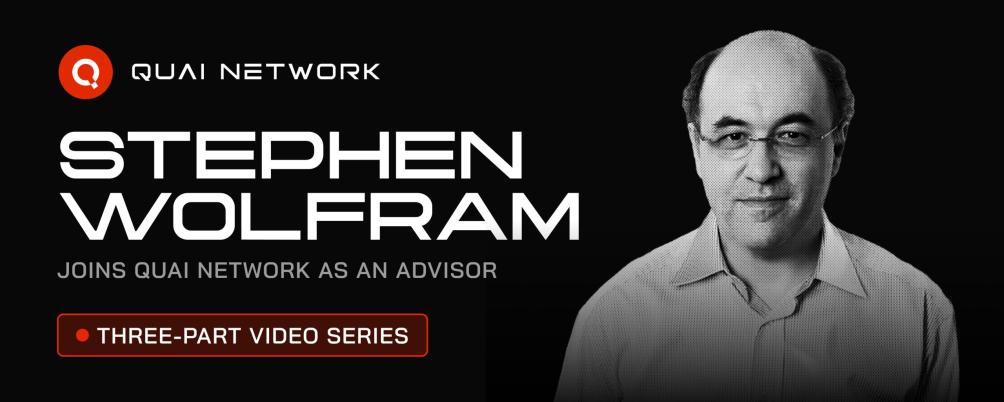
Quai, a scalable Layer-1 crypto network with a native energy dollar, announces the appointment of world-renowned physicist and AI expert Stephen Wolfram, Founder and CEO of Wolfram Research, as an advisor. This strategic move highlights Quai’s commitment to advancing the intersection of decentralized technologies and computational solutions, with Wolfram’s expertise poised to significantly enhance the network’s thermoeconomic energy dollar design. The collaboration is particularly unique as it blends Wolfram’s studies of economic models through physics with Quai’s Proof-of-Entropy-Minima scalability solutions, setting a new standard for blockchain networks.
“The more I’ve learned, the more impressed I’ve become. This is an intellectually deep story … a far-reaching vision backed by a lot of good ideas … that have remarkable resonances with fundamental science I’ve done,”
– said Stephen Wolfram.
Listen in to the Three-Part deep dive with Stephen Wolfram and Dr. K from Quai Network:
Quai Network’s partnership with Wolfram marks a significant step in the development of a decentralized, energy-backed financial ecosystem. With Wolfram’s scientific insight, Quai is poised to address some of blockchain’s most pressing challenges, such as scalability, transaction speed, and economic stability. By creating a model rooted in real-world energy values, Quai is aiming to empower users with a stable, robust currency while providing a scalable infrastructure that meets the demands of global commerce.
“Having Stephen Wolfram join us is transformative for Quai Network. His computational and theoretical physics expertise will help us achieve our ambitious goals of scalability and energy-backed currency. This partnership is a key component of our commitment to building a blockchain built using scientific first principles allowing us to create a truly scalable and decentralized energy-based economy,”
– said Dr. K, CTO of Quai Network.
Through this advisory role, Wolfram will contribute to Quai’s efforts in developing advanced scientific principles to support the platform’s ambitious thermoeconomic model. As the creator of tools such as Mathematica, Wolfram|Alpha, and the Wolfram Language, Wolfram’s work in computation has shaped fields ranging from mathematics to artificial intelligence. His involvement in the Wolfram Physics Project and authorship of the landmark A New Kind of Science demonstrates his commitment to pushing boundaries. These are qualities that align closely with Quai’s mission of setting new standards in blockchain performance, scalability, and thermoeconomics.
About Quai Network
Quai Network is the first scalable and programmable Proof-of-Work blockchain, designed to support high-throughput, low-cost transactions through its innovative PoEM consensus mechanism. With the potential to process over 50,000 transactions per second via horizontal sharding, Quai is positioned to facilitate global economic activities. The platform is developing the Energy Dollar (Qi), the world’s first energy-backed digital currency, to provide stability and real-world value in the blockchain ecosystem.
About Stephen Wolfram and Wolfram Research
Stephen Wolfram is a physicist, computational scientist, and founder of Wolfram Research, where he created Mathematica, Wolfram|Alpha, and the Wolfram Language. He is the author of the influential book A New Kind of Science and the creator of the Wolfram Physics Project, which explores fundamental questions about the structure of space and time. His contributions to computation and complex systems are widely recognized as groundbreaking, with applications across science, technology, and finance.For more information on Wolfram Research, visit https://www.wolfram.com/.
